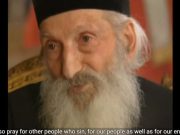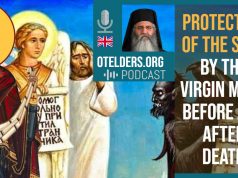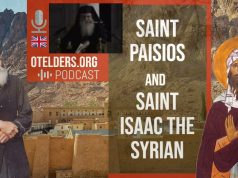In this enlightening episode, Metropolitan Athanasios of Limassol takes us on a spiritual journey into the profound realm of “Spiritual Tears.” Explore the significance and transformative power of tears shed in moments of deep repentance and spiritual awakening. Metropolitan Athanasios offers insights into the cleansing and healing nature of these tears, illuminating their role in the journey towards a more profound connection with God and the pursuit of inner peace. Gain a deeper understanding of how spiritual tears play a vital role in shaping the path of a devout Orthodox Christian, bringing solace and growth to the soul.
Audio source: ΙΕΡΑ ΜΗΤΡΟΠΟΛΗ ΛΕΜΕΣΟΥ ΡΑΔΙΟΦΩΝΙΚΟΣ ΣΤΑΘΜΟΣ
November 10th, 2022, Cyprus
Listen to this sermon on Spotify, Google Podcasts, Apple Podcasts and Anchor:
Metropolitan Athanasios of Limassol:
A question asks, “You talk to us often about tears. Could you tell us a few words on the issue of tears?”
As said, we will say a lot not just a few words on tears since this issue is big and important, not just for the spiritual life of man but for his whole life, even for his mental and physical health. Above all for his spiritual life, the issue of tears is really important.
It’s a bit of a paradox to talk about it and analyze it since tears evoke pain, sorrow, difficulties, things that are not pleasing. The church, however, through the experience of the Saints and through her experience with man realized that, in the end, tears are really useful and beneficial and helpful to the spiritual life. The same goes for mental health. I will say a few words that I know on the latter.
Abbas Isaac says that the spiritual life starts from tears. When you realize that you have tears in your prayer or during a good spiritual state, know that God touched the eyes of your soul and something spiritual and beneficial started happening inside you. Besides, our very own Christ told us, “Blessed are those who mourn, For they shall be comforted.” [Matthew 5:4] At another point, He says, “Blessed are you who weep now, For you shall laugh.” [Luke 6:21] We emphasized this in relation to our holy elder Joseph [of Vatopedi], who was crying his whole life but smiled when he fell asleep. You can see this “supernatural” smile on his face after his repose. These are words of Christ and Christ’s words are perfect and has no room for imperfection. If a man cries, this means that he expresses himself and expression always gives rest to man. If you see a man not laughing and not crying, know that he is sick. Even if he is not sick, he is poised to become sick. If he does not cry, he will create some trauma in his mental world.
Some two months ago, I went to Mt. Athos. At the airport, there was a group of ladies who wanted to look young and they were taking photos. When they were taking photos, their smile was that big. The rest of the time, they had a rough, unyielding, iron, wooden face which radiated much trouble. When they were taking photos, however, their smile was too big. Fake smiles. There was a poor one who was taking photos of herself. I also notice that in funerals, you barely see people crying. All of them wear black glasses. I did not know the reason for that and they told me that they wear black glasses so it’s not obvious that they are not crying. I imagined the opposite. Because they did not want to be seen crying. I remember my grandmother. When she would go to a funeral she would start crying as soon as she left the house up to the point she got back home and even longer. She would say, “Is it possible to go to a funeral and not cry?” People used to cry and this helped them avoid having repressed feelings. They cried, they mourned. Maybe they cried with a dose of exaggeration, but this was something that helped them balance their inner world. This is why after the funeral ended, they did not suffer other psychiatric, psychological and repressed problems. It’s a good thing for man to express himself either by laughing or crying. This is our nature.
Spiritual tears are something more and different from the normal tears which are born by different external causes. Spiritual tears are a state which is born by the Grace of the Holy Spirit inside the heart of man. It’s what the fathers call «κατάνυξη» in Greek/katanyxis [compunction]. Meaning an energy of Grace which takes place inside our hearts and the heart starts crying right away. Man cries internally and externally. He cries while nurturing holy sentiments, sentiments of prayer, love, peace, repentance and all holy sentiments that the Grace of God cultivates inside the heart of man. There are tears that are demonic. Such as the tears of hate. One hates someone else and cries out of his hate, his malice, his nerves. I have seen people who cry because of their nerves, because of envy, evilness, egoism and pride. Just as the tears of God rest and give peace to our soul, in the same way demonic tears distort our soul and plunge her into demonic energies and demonic passions.
How do we discern where tears come from? From their fruits. As we said the other time, we understand whether a thought comes from God, from devil or from man based on the sentiments, the fruits it produces. In the same way, if tears are from God, they move us towards repentance and towards love for God and our brother. If they are from demons, they move us to despair, to vanity, to sensuality, to avarice. I am crying because I lost the lottery or because someone bothered me. These are not helpful. There are also human tears which are natural. When you go to a place of mourning, when you see something unpleasant, when you see something sad. You are a man, you are going to cry. It’s not bad to cry.
Spiritual tears are born by a cultivation. It is something that is cultivated. It’s not something you just expect to come. When you pray, you must cultivate the tears in your prayer in order to cleanse your heart and feel the Grace of the Holy Spirit. He who cries in his prayer, he prays much therapeutically, he cures his heart. In order to succeed in this effort there are some preconditions to be observed with accuracy and thoroughness. For example, to have time. If we go pray at night and we have the agony to finish as soon as possible so that we can finish the rest of our obligations and go to sleep, neither tears nor compunction arrives.
We need to give time to ourselves. To give him time to do an introspection. This does not take a lot of time. To devote half an hour a day is enough. Just as our elder taught us, it is good for the man to do a confessional prayer, that is, to talk to God with his own words. Our elder, Joseph of Vatopedi, was a tutor of such a prayer, because he had a lot of experience himself. It is obvious that the elder, during this prayer, talked at any given time, with God. In some way, he “wrestled” with God and condemned himself for his sins as a convict in front of God and he was trying to attract the divine Grace in his heart with much humility. For the man to pray and attract the divine Grace, he needs much humility. Self-condemnation is what the fathers say. To blame yourself. To excuse yourself for nothing. Because excuse drives out repentance. Only the humble man repents. The humble man never excuses himself. But the prideful man [always] excuses himself. Whatever he does, he finds an excuse.
I have told this other times as well. I have seen people who have committed murders. They came to confess and they still provided an excuse for their action. “I killed him, but I killed him because he was a scoundrel. I killed him because he bothered me, because he messed with my friend.” He excused his action and that’s why he did not have repentance. The man who excuses himself never repents. The one who bears his fault is the one who repents. “He might be a scoundrel, he might have bothered me, but I do not have an excuse to kill him. I have no excuse to annoy him, to treat him badly.” The one who does not excuse himself, he has established a starting point of repentance through the humility he displays. And when he prays, he holds a right position during prayer and attracts the divine Grace. And the divine Grace brings the tears and the repentance to man. Thus, it is important to make time for ourselves for prayer.
It is also good, my brothers and sisters, to find time for ourselves as we find time for so many other things. But for us to do that, we need to throw the mobile away from our hands. The mobile is a big problem. Everywhere with a smartphone, especially young people. Everywhere! They don’t talk to each other anymore. They even check their phones while in the toilet.
Once, we were hosted in a house in Athens, and inside the toilet, there was a library. Magazines, crosswords etc. “Don’t you have space for these?” I asked. “No, father, those are books for the toilet.” How will a man pray when he hangs from his phone? He cannot communicate with his wife, his children and himself anymore. How is he supposed to communicate with God through himself? We must show restraint. When I say that I am going to pray for 20 minutes, it means that I will leave my phone away and I will devote 20 minutes for prayer, my spiritual labor. If this is not possible in our homes, at least let us do it in church. Since we, Orthodox, have long hours of service, especially if we attend early on. The time in church is really crucial for the man to do an introspection, to converse with himself. To criticize, to control, to consult himself.
Just as Prophet David did, “Why are you so sad, O my soul? And why do you trouble me?” [Psalms 41:12] Ask yourself, “Why am I troubled?” My friend insulted me. Have you not also insulted your friend? If not now, some other time. Even if you did not insult him, you might have insulted someone else. And if you think you have insulted no one, you still have done other things, which might be even worse. Why do you react like this then? Thus, a dialogue with ourselves is a good thing. But a dialogue where we do not find excuses for ourselves, but we manage to control him [our inner state] and bring him to his senses. During this dialogue, man evokes God to help him. He begs God to forgive him. I advise you to listen to the prayers of elder Joseph [of Vatopedi] and find out how the Saints prayed and how they condemned themselves before God. Meaning there was “a fight,” “a wrestling” with God in order “to conquer” the mercy of God and attract His Grace in their hearts. This requires time of silence which we need to provide to ourselves. It also requires humble predisposition and repentance. To understand that we have many faults, weaknesses and sins. To prepare ourselves during the day for the prayer of the night. Just as the father say, “The attention during the day works for the sanctity of the night.” Let the day prepare us for the nightly prayer and the nightly prayer prepare us for the everyday fight in front of us.
We must have a regular program. Disorder and messiness do not help the man, especially in the beginning of spiritual life. Surely, we have many obligations and we do not have a steady schedule. But let us make some time as much as we can. God says in the Holy Scripture, “Be still, and know that I am God;” [Psalms 45:11] Calm down, stop occupying yourselves with other things and only work on one thing, the presence of God inside our hearts. Let us have the disposition to provide this spiritual state to ourselves. I think it’s very difficult if a man does not talk to himself. Our self will become a foreigner to us and he might even become our enemy. Especially, nowadays, man does not want to be left alone. You see that people hate isolation, they cannot spend five minutes with themselves. The TV, the radio and the telephone must be on while in the house. Man cannot stay alone, because himself is not his friend. It becomes his enemy. He does not converse with himself, he does not humble himself. He does not nourish himself with prayer and the tears of repentance in order to befriend himself and realize that his best friend is himself. It is really important to have time to enter your heart and converse with yourself and witness this Grace of God inside your heart. I am not sure if it is a thing that comes with age but it seems that, while getting older, man has this need, to converse with himself. We must find this time to calm down, to find peace in our hearts, peace in our thoughts, peace in our soul and converse with ourselves. To this end, the noetic prayer, the invocation of the name of Christ, helps a lot. The prayer, “Lord Jesus Christ have mercy on me.” This little prayer, as we have said many times, is short, it’s easy. It can be said many times easily. It has the power to attract the Grace of God in the soul of man, to give birth to holy sentiments and it is a spiritual labor.
Saint Paisios used to say that the nous of man resembles a mill. Just as you add wheat to the mill and you get flour and you are able to make good breads. If you add wheat, you will get flour, [but] if you add stones, you will get dirt. The same goes for the nous. If you add spiritual labor to the nous, such as the Jesus prayer, it will then give you holy sentiments and the inside of our heart will cleanse and holy things will spring from the heart. If you add dirty thoughts, then you will get bad sentiments and bad dispositions. This is why Christ says, “from the heart of man come all the passions and all the weaknesses.” And the whole work of our church is to cleanse our hearts. And we cleanse our hearts with prayer, by studying. By studying the word of God and the works of the Holy Fathers. Because they are written with the Holy Spirit. The Holy Spirit acts in our hearts and the heart of man cleanses by herself. Then, she is filled with clean and holy senses. She is filled with holy pictures.
We have said that it is really important to have a store of holy senses and holy pictures. This is why we fill the walls of the church with holy icons, so that our mind and our senses have spiritual nourishment. The vision, by seeing the holy icons of the Christ, the Panagia [Theotokos] and the Saints. Our taste by tasting the Holy Sacraments. Our smell, we incense inside the church as well as the fragrance the holy relics exhale. We touch the holy objects, we listen to the psalmodies of the Saints. All these things fill our senses with “holy material”, with holy icons, with holy senses. So, when the time comes that we need to draw help and strength for our fight, we have a spiritual store, full of good senses, from which we draw new and old treasures as the Holy Scripture says. Whereas if it is filled with dirty things, then during the times of silence passions and impurities will come up to torment us. Many things are obstacles to the establishment of the conditions for prayer, tears and a clean heart. Whatever drives away the grace… The enslavement to passions drives away the Grace and when the Grace is driven away, tears stop. The Holy Fathers who worked on this holy process of tears realized that even the smallest concession to a passion deprived them of the divine Grace and, subsequently, of the tears.
Many times, St. Ephraim Katounakiotis used to tell us many examples where his actions were affected by passions and the Grace abandoned him right away. He felt abandoned by the Grace and it took a lot of effort to attract the Grace back to his heart and return to his [former] spiritual state. Criticism is very harmful to prayer, tears and reverence. If we criticize other people, know that we will lose our prayer and we abandon the Grace. Whatever we criticize our brothers for will, eventually, return back to us. God will permit for it to happen to us and even worse. We will also embarrass ourselves in the case it happens publicly to us. Because criticism is hate, it’s evil. He who criticizes does not love his brother. The one who loves his brother treats him with understanding and sympathy and covers the mistake of his brother. Criticism is egoism. The humble man does not criticize anyone, because he admits he is worse than anyone else. Who is there to criticize since I do worse things and I am even worse. Having a lot of cares also hurts tears and katanyxis [compunction]. To have a thousand things on our mind and never be able to calm down.
Of course, we live inside the world and we have obligations and cares. But our Christ said something we need to emphasize. “Therefore I say to you, do not worry about your life” [Matthew 6:25] Let your soul have no cares. Let your nous have cares but not your soul. Meaning have peace in your heart and leave everything in God’s hand. Your mind can be preoccupied with stuff such as what are we eating today, what are we buying today for our home, how will I send my kids to college, how will I deal with everyday problems. Let our mind, our logic deal with these things. But let our heart have absolute peace with no cares. Let us be able to guard the interior of our heart peaceful and undisturbed. This is difficult but the man who lives spiritually can achieve it. This is why Christ says in the Parable of the Sower, “Now the ones that fell among thorns are those who, when they have heard, go out and are choked with cares, riches and pleasures of life, and bring no fruit to maturity.” [Luke 8:14]
These three things, the cares, the riches and the pleasures, Christ told us, suffocate the seed of God and do not allow it to bear fruit. In addition, we cannot pray when we eat too much. After you have devoured too much food, it’s impossible to pray. Prayer takes place with an empty stomach. Whoever eats a lot like me is unable to pray. This is why the Divine Liturgy takes place in the morning in order not to be full. Neither to be full and yawn, nor to have an empty stomach. When man is not careful with food, he drives away the spirit of compunction. He cannot pray, he cannot study, he cannot have compunction. Of course, everything must be done in moderation. Depending on the needs and depending on the place and time each one finds himself. Moderation helps a lot in this case.
Messiness is another thing that hurts. Messines does not help man in his spiritual life. The spiritual man is a man of order. He is not messy. If you go to a room and it’s messy, know that this man will never pray. He cannot pray in a messy place. Our elder Joseph [of Vatopedi], who was a man of great order, always had his pen in the same place, his pocketknife in the same place, his chair in the same place. He was an ascetic, an old man and yet the few things he had were always in order. One night, I was with Saint Paisios. He saw me being sad and he asked me, “Why are you sad?” I told him, “I have not received a letter from my elder [Joseph] who is in Cyprus and I do not know what’s going on.” My elder was in Cyprus and I was in Mt. Athos. Saint Paisios says, “We will go visit him. What flights go to Cyprus? Does Olympic Air fly to Cyprus?” “Yes it does,” I answered. “So, we will take Olympic Air.” “Saint Maximos Kavsokalyvites would eat a rusk and travel from one place to the other. We will also eat a rusk and have a tea and then travel to Cyprus.” Saint Paisios said. I realized he was joking. We ate our rusk, we drank our tea, I then fell asleep. Saint Paisios managed to see through the Holy Spirit the cell of the monastery where my elder lived in Cyprus. In the morning, he tells me, “Deacon, I passed by to take you but you were sleeping. I left alone. The plane could not wait for you.” He described to me exactly how the monastery and the cell of my elder in Cyprus was. He told me, “What an orderly man, your elder is! All things are in their place. The prayer rope in its place, his bed always tidy, the mat where he knelt and prayed always tidy.” A simple, humble [cell], poor but perfect [at the same time]. The same goes for St. Paisios. He lived in absolute poverty. He had nothing in this world. He could grab two bags [with his belongings] and move [someplace else] right away. He did not have material possessions. Once, someone bought him a strainer so he could make his tea. Saint Paisios said, “You bought the strainer for me but now, I need a place to put it, I also need to clean it. Better take it back.” I see someone in the crowd who winced. Still, I have to tell you that I have drunk many teas in my life in many great lounges, hotels and restaurants. And when we were in Russia, poor Putin prepared a dinner for us in the Kremlin and had golden spoon for us, at least they looked like it. I thought let’s eat once with golden spoons and realize whether the food tastes better. Still, I have never come across in my life something that compares to the tea of St. Paisios, neither will I in the future. Because it was full of the blessing of God and the Grace of the Holy Spirit. This poor hut [of Saint Paisios] was worth more than the palaces of this world. So, messiness is a bad thing for man. The messy man is poised to do messy things in his spiritual life as well.
I remember when elder [Joseph of Vatopedi] dropped something and he stooped to lift it and the people would say to him, “Elder, leave it for later.” And he said, “Not later, now. Because if I leave it for later, I will never do it.” So, the poor old man stooped little by little to catch the paper he dropped and put it back in the basket. They were such orderly people and that’s why they never neglected their spiritual programs. They were orderly people and that’s why they had tears. I told you that our elder Joseph was a man of many tears. Do not assume that these are depressive tears. To the contrary, these tears cure depression. The spiritual tears cure psychiatric depression because they give birth to divine consolation, doxology, gratefulness, love inside the heart of man. They give birth to hope, light and this is why they might be tears of repentance, caustic tears at first which burn the heart of man but they also cleanse it. And when the heart is cleansed it becomes full of light and the man sees the Light of God in his heart and he is consoled and he is joyful. This is what I wanted to tell you concerning tears.
Since you will probably have some questions and not to tire you any longer, you have the floor if you want to ask anything.
[Question from crowd]: “Your blessing, elder. I wanted to ask you what the dividing line between self-criticism, as you described it, and overthinking is?”
[Metr. Athanasios]: Self-criticism in God leads man to repentance and hope. The “secular” self-criticism leads to depression and despair. If we see that despair, darkness, a stressful situation is born inside us by self-criticism, it’s not from God, and we should stop it. If, however, it gives birth to hope, consolation, heavenly joy, then we should cultivate it because it is from God and it helps us. Thus, the result of our effort makes us realize whether we are working right or wrong on ourselves.
[Question from crowd]: “Your blessing elder. I wanted to ask whether we should take the children with us to funerals. Especially, when the departed is a close relative of theirs. Recently, we had an 8-year-old whose mother died. In such cases, do we take the child to the funeral?”
[Metr. Athanasios]: “No do not take it! Because it’s a small child and will be hurt. Death is something that is outside of our nature. It is difficult for small kids to handle it. Especially, the sight of the dead man is not a good thing. If it’s an older child and can handle it, let it go. But, it is better that the small child does not have an image of her dead mother in the coffin.
[woman from crowd]: “But we should tell him that his mother has died…”
[Metr. Athanasios]: Yes, say it with a proper manner. Besides, he will realize it sooner or later.
[Question from crowd]: “Your blessing, elder! I wanted to ask whether the confessional prayer, that you mentioned as really beneficial to man, can substitute the common prayers [of our church].”
[Metr. Athanasios]: Sure it can. The prayers of our church—such as the Compline and others—are prayers. The confessional prayer is also a prayer. If I have at my disposal 15 minutes for prayer and I can pray confessionally instead of doing the Compline, I should do it. The confessional prayer takes the place of the Compline. If I can manage to do both, it’s a good thing, but it’s not necessary. If I don’t have enough time and I am attracted to the confessional prayer, I should confine myself to it. It depends on how the man is willing to fight at that moment.
[Question from crowd]: “If we are unable to pray during the day and we pray at midnight, at 2 or 3 am, is it still valid?”
[Metr. Athanasios]: Sure, prayer is always valid. Especially, when it takes place with struggle and sacrifice, it has an even bigger impact to our spiritual world.
“Thank you elder”
[Question from crowd]: “Your blessing, elder. You said that we should be humble. But I went to a job interview today and they told me, ‘Because you are humble and quiet and you do not have confidence, we are not hiring you.’ They told me you need to be more ‘toughie.’ There are people who are less skilled than me but because they are ‘more toughie’ and get more chances.
[Metr. Athanasios]: What can I say? It can’t get any worse than that! Maybe they meant that you need to be more expressive, more courageous. Humility does not take away from our courage and our confidence. Humility helps us. But humility and audacity are two different things. The same goes for bravery and audacity. To have the courage to help sell my product, that’s fine. But to have the audacity to tell lies [to achieve the same purpose]. That’s not good! Courage, yes, audacity, no.
[Question from crowd]: “Elder, during [personal] prayer or in church, our mind gets distracted and comes back 5 minutes later.”
[Metr. Athanasios]: If it’s just 5 minutes, then you don’t need to worry, Panayiotis. There are times when it does not come back at all. When we go to an all-night vigil, we barely can keep our eyes open. When the vigil ends, we are full of energy. “Resurrection of the dead” says St. John of Climacus. This happens to all of us. It’s our struggle. The nous gets distracted, we need to bring him back. As soon as you realize it got distracted, bring it back. And God watching the struggle man makes to bring his nous to prayer, little by little will help him and the nous will follow prayer by himself with the grace of God.
[same man from crowd]: “Also, during the Services is it better to pay attention to the words of the priest and the chanter or say the Jesus prayer?”
[Metr. Athanasios]: Whatever looks better for us at that time. There is not a certain thing for all occasions. Sometimes we prefer to say the Jesus prayer, sometimes we prefer listening to the chanter, sometimes we prefer listening to the words of the priest. Sometimes, we prefer praying with our own words. Let’s find what is best at the time. It depends on the Service and our own spiritual state. It even depends on our own physical condition.
[Question from crowd]: “Good evening, father. I wanted to ask as concerns someone who does not pray often but thinks of a prayer inside him without speaking. Does God listen? Is it considered a prayer?”
[Metr. Athanasios]: Certainly, we do not need to use our mouth. God sees and listens to everything. Even if we are inside the church and do nothing, our mere presence in the church is important. Our existence is sanctified. I do not endorse going “like a chump” to the church. But even if we are a chump, it’s better for us to be there than anywhere else.
[Question from crowd]: “Elder, we might have some hobbies like sports, which are not bad in nature, but divert us from the Christian life.”
[Metr. Athanasios]: It’s better to discuss this with our spiritual father. If they are not good, why be bad? But since there are so many different circumstances and occasions, it’s better to discuss this with our spiritual father.
[Question from crowd]: “Your blessing, elder. When we talk about a person that did something bad, is it always considered criticism from which we should abstain? Even if we are merely discussing his problematic attitude.”
[Metr. Athanasios]: Do we speak out of love to help him or out of a need to expose him?
[man from crowd]: “If somebody did something wrong and the family is discussing how to deal with it, is it considered a criticism?”
[Metr. Athanasios]: If we treat it as a family problem, a member of our family did something wrong and we are considering how we can fix it out of love and pain for our brother, it’s not bad. But if we do it with the purpose of criticizing him and insulting him, it’s not good.
[Question from crowd]: “Your blessing, elder. If one has not read the Prayers before Communion, is that a reason to postpone receiving Holy Communion?”
[Metr. Athanasios]: It’s not a strict precondition. Let us not make into dogma the fact that you have to read the Θεία Μετάληψη. On the other hand, receiving the Holy Communion is not something that should happen carelessly and without preparation.
[Question from crowd]: “Elder, in the spiritual fight, the key is humility and repentance. Entering the initial stages of the spiritual struggle, there is the fear of sin and you are much worried when you fall into sin. Is this spiritual vigilance necessary?”
[Metr. Athanasios]: Vigilance is necessary, panicking is not. Why panic? We are weak and sinful people and we fall into sin. Let us repent, ask forgiveness from the Lord and go to confession. And if we do not remember to confess all sins, when we remember them, let us confess them. Because sometimes this turns into a compulsion. We do not need to turn spiritual life into a torment. You confessed, you described your sins, if the spiritual father asks you something, say it, if he does not ask [something else], don’t say anything else.
[Question from crowd]: “Your blessing, elder. We said that those who do not cry and do not laugh have some problem inside them. When we fail to express our feelings, is this a problem or is it possible that this is someone’s nature.”
[Metr. Athanasios]: You will find some place to express yourselves. To be like an iceberg, with no expressions and without your fellow man knowing what’s going on with you, it’s difficult. Surely, we cannot express to all people in the same manner, but there must be some people, we can express our feelings. Or at least express to God or to yourself.
Let us do our prayer:
“O Christ the true light, who enlightens and sanctifies every person who comes into the world: Let the light of Your countenance shine on us, that in it we may behold the uncreated light. Guide our footsteps aright in keeping Your commandments, through the intercessions of Your most-pure mother and of all the saints.”
Through the prayers of our holy Fathers, Lord Jesus Christ our God, have mercy upon us and save us. Amen.
This English translation of the homily of Metropolitan Athanasios of Lemessos, given on November 10th, 2022 in in the auditorium of the Holy Metropolis of Lemessos, Cyprus, was recorded for otelders.org, Orthodox Teaching of the Elders, by Peter Eliades.

 Română
Română


































